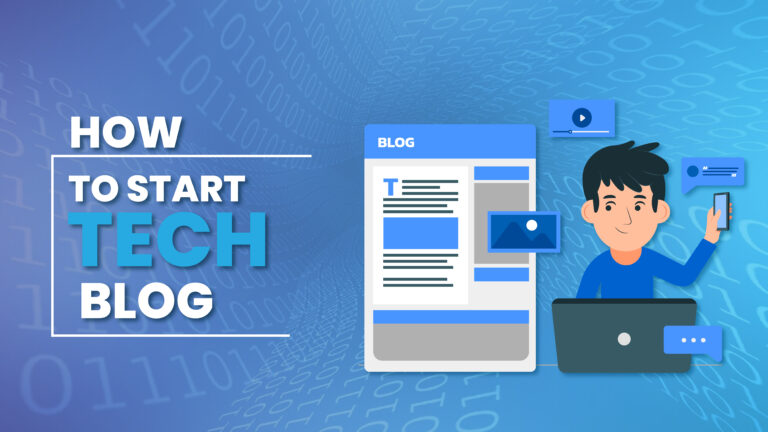Technology is one of the most exciting things shaping our world today. If you’re anything like us, discovering new gadgets, exploring fresh innovations, and staying updated on the latest tech trends brings you endless curiosity and joy. It’s a world that never stops evolving, and that’s exactly what makes it so fascinating.
At some point, every tech enthusiast asks the same question: “How can I start my own tech blog?”
A space where you can share your thoughts, review cool products, talk about new software, or express your passion for technology. The idea itself feels exciting, and yes, it can also be advantageous.
The good news? Starting a tech blog in 2026 is easier than ever. With the right tools, mindset, and a clear step-by-step approach, you can turn your love for technology into a platform that educates, inspires, and even earns you income.
What Is a Tech Blog Really?
A tech blog is an online space where you share insights, reviews, and opinions about the world of technology from gadgets and apps to software, AI tools, and everything in between. It’s where your curiosity meets creativity.
Some tech blogs focus on breaking news and product launches, while others dive deep into tutorials, software comparisons, or honest gadget reviews. You don’t have to be a professional developer or a tech journalist to start one; all you need is a genuine interest in technology and the desire to share what you learn with others.
Think of a tech blog as your digital voice in the tech world. It’s not just about writing; it’s about helping people understand innovations, make smarter tech choices, and stay ahead of the trends. Over time, your blog can become a trusted go-to source for readers who love how you explain things in a simple, human way.
Why Start a Tech Blog in 2026?
There’s never been a better time to start a tech blog than right now, in 2026. Technology is evolving at lightning speed from AI-powered tools and smart home devices to wearable tech, cybersecurity, and futuristic startups. People are constantly searching for reliable, easy-to-understand information to keep up with it all. That’s where you come in.
Starting a tech blog in 2026 gives you the opportunity to:
- Share your voice in a booming global industry.
- Build authority in a niche you love.
- Use AI tools to research, write, and grow faster than ever.
- Monetize your passion through affiliate programs, ads, and sponsorships.
With the rise of AI and digital innovation, blogging is no longer just a hobby — it’s a real career path. Whether you dream of becoming a full-time content creator, growing a personal brand, or simply sharing your love for tech, this is your moment to start.
How to Start a Tech Blog (10 Easy Steps)
1. Choose a Tech Niche That Truly Engages Your Audience
Choosing a niche is the first and most important step toward building a successful tech blog. In 2026, the tech space is broader than ever from AI breakthroughs to consumer gadgets but the key to standing out is focus. A well-defined niche helps you attract loyal readers and establish authority in a specific area of expertise.
Some profitable and trending tech niches for 2026 include:
- Artificial Intelligence & Machine Learning: Cover everything from AI productivity tools to ethical AI debates, deep learning, and real-world applications.
- Blockchain & Web3: Discuss cryptocurrency trends, decentralized finance (DeFi), NFTs, and blockchain-powered startups.
- Cybersecurity: Write about online safety, data privacy, ethical hacking, and the latest cybersecurity software reviews.
- Gadgets & Consumer Tech: Review new devices, compare gadgets, and share hands-on impressions of smart home products, laptops, and wearables.
- Programming & Software Development: Offer tutorials, coding projects, and industry insights for developers.
2. Understand Your Audience to Create Content That Connects
You can’t grow a blog if you don’t understand who you’re writing for. The best blogs in 2026 build content around reader intent not just SEO keywords.
Start by learning about your audience’s:
- Demographics: Their age, profession, and level of technical knowledge.
- Interests: Are they looking for gadget reviews, AI tutorials, or startup insights?
- Content Preferences: Do they prefer bite-sized content or deep-dive guides?
Use tools like Google Analytics 4 and Hotjar to see how users interact with your blog. Watch what’s trending in online spaces like Discord tech servers, Reddit, and LinkedIn groups — they’re full of real user questions waiting to be answered.
3. Pick a Blogging Platform That Matches Your Vision
The platform you choose defines your blog’s flexibility and growth potential. In 2026, creators have more options than ever:
- WordPress.org: The most popular and powerful platform for bloggers who want complete customization, SEO control, and plugin flexibility.
- Ghost: A sleek, fast, and SEO-ready option for those who value simplicity and performance.
- Substack or Medium: Ideal for those who want to focus purely on writing and building a loyal email audience.
4. Design a Clean, User-Friendly Blog Layout
Your blog design shapes the first impression readers have of you. A modern, professional layout keeps visitors on your site longer and improves SEO rankings.
Focus on these essentials:
- Responsive Design: Over 60% of your audience will browse on mobile. Make sure your site looks perfect on all devices.
- Simple Navigation: Categorize your posts clearly (e.g., Reviews, Tutorials, Trends).
- Readable Fonts: Use simple, clean typography and maintain visual balance with white space.
- Speed Optimization: A slow website kills engagement
5. Create High-Quality, Insightful Content
In 2026, readers expect value. Every post you publish should either teach, inspire, or help solve a problem.
Here’s how to create content that stands out:
- Do Deep Research: Back your claims with credible sources like TechCrunch, Wired, or official documentation.
- Make Tutorials & Guides: Break complex topics into actionable steps with screenshots or videos.
- Write Honest Reviews: Readers trust authenticity. Share your genuine experiences and recommendations.
6. Optimize Your Blog with Advanced SEO Strategies
Search engine optimization is still king in 2026 but it’s evolved to favor natural, AI-assisted, and semantically rich content.
To rank higher on Google:
- Use AI keyword tools like SurferSEO or NeuronWriter for smart topic targeting.
- Optimize for voice search by writing conversationally and including FAQs.
- Add internal links to guide readers deeper into your site.
- Use schema markup to improve click-through rates with rich results.
7. Use Social Media to Build Reach and Authority
Social platforms are powerful tools for spreading your content and building trust. In 2026, the best strategy is to create content once and repurpose it everywhere.
- LinkedIn: Share thought-leadership articles and engage in tech discussions.
- X (Twitter): Post quick updates, tips, or threads about your latest post.
- YouTube & Instagram: Turn your blog content into short-form videos, reels, or explainers.
8. Monetize Your Blog with Smart Strategies
Once your blog gains steady traffic, it’s time to turn your passion into profit. Monetization in 2026 goes beyond ads it’s about building authentic value partnerships.
Popular methods include:
- Affiliate Marketing: Recommend trusted software, gadgets, or hosting platforms you’ve personally used.
- Sponsored Posts: Partner with tech brands to feature their tools or devices.
- Digital Products: Sell your own eBooks, templates, or mini-courses.
- Display Ads: Use Google AdSense or Ezoic for automated ad placements.
9. Track and Improve Using Data
Growth doesn’t happen by guessing it happens by analyzing. In 2026, data-driven insights are your best friend.
- Google Analytics 4: Understand where your traffic comes from and which posts perform best.
- Hotjar / Microsoft Clarity: See exactly how readers interact with your pages.
- Ahrefs / SEMrush: Track keyword rankings and backlinks.
Pro Tip: Review your analytics monthly. Identify which types of content attract the most engagement and replicate that success.
10. Keep Your Blog Fresh and Future-Ready
Tech evolves daily and so should your content. Updating old posts not only improves accuracy but also boosts rankings in Google’s freshness algorithm.
Here’s how to stay current:
- Update stats, screenshots, and examples every few months.
- Add new insights and trends relevant to your niche.
- Re-promote updated posts on social media.
Conclusion
Starting a tech blog in 2026 is more than just sharing ideas it’s about building authority in one of the fastest-growing industries. If you choose the right niche, publish consistent, high-quality content, and apply proven SEO and promotion strategies, your blog can become a go-to resource for readers worldwide. Remember, success doesn’t come overnight, but with persistence and smart planning, you can grow a tech blog that not only attracts traffic but also generates long-term income
Frequently Asked Questions (FAQs)
How do I choose the right niche for my tech blog in 2026?
Start by blending your interests with trending topics in the tech industry. Look into areas like AI tools, cybersecurity, software reviews, and smart gadgets. Use keyword research tools such as Google Trends, Ahrefs, or Ubersuggest to identify niches with strong search demand but low competition.
What is the best platform to start a tech blog in 2026?
WordPress.org remains the most flexible and SEO-friendly option for serious bloggers. It gives you full control over your design, plugins, and monetization methods. However, platforms like Ghost, Medium, or Substack are also great for creators who prefer a simpler setup and a focus on writing.
Do I need to be a tech expert to start a tech blog?
Not at all. You just need curiosity, a willingness to learn, and consistency. Many successful tech bloggers started as enthusiasts and grew their expertise by researching, testing tools, and sharing what they discovered in a relatable way.
How often should I post new content on my tech blog?
Quality always beats quantity. Posting once or twice a week is a great balance — it allows time for proper research, editing, and SEO optimization while keeping your readers engaged with fresh content.
How can I attract more readers to my tech blog in 2026?
Focus on SEO, social media marketing, and community building. Share your posts on platforms like LinkedIn, Reddit, and X (formerly Twitter). Engaging in tech groups, commenting on related blogs, and updating older content regularly can also boost your traffic.
What are the best ways to monetize a tech blog today?
In 2026, top monetization options include affiliate marketing, sponsored content, display ads, and selling digital products like eBooks or online courses. Choose strategies that align with your content style and audience interests for the best results.
Can AI tools help me run my tech blog?
Definitely. AI tools such as ChatGPT, Jasper, and SurferSEO can help you research topics, create outlines, optimize keywords, and even generate content ideas. Still, your personal experiences and opinions will always make your blog unique and trustworthy.
How long does it take to grow a successful tech blog?
Building a tech blog takes time, typically around six months to a year to gain consistent traffic and income. Growth depends on your niche, posting consistency, SEO efforts, and how well you engage your audience. The key is to stay patient and keep improving with every post.
What mistakes should new tech bloggers avoid?
Avoid covering too many topics at once, neglecting SEO, or publishing low-quality content. Don’t forget to build an email list early it helps you connect directly with your readers and reduces reliance on search engine traffic.

